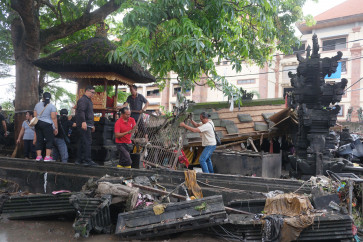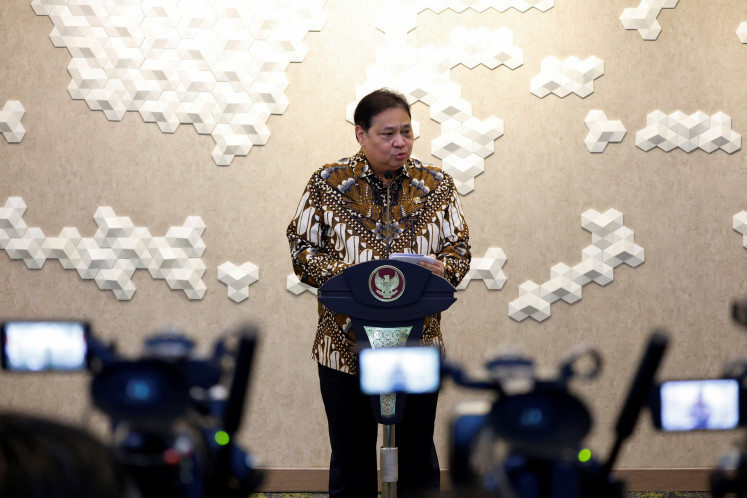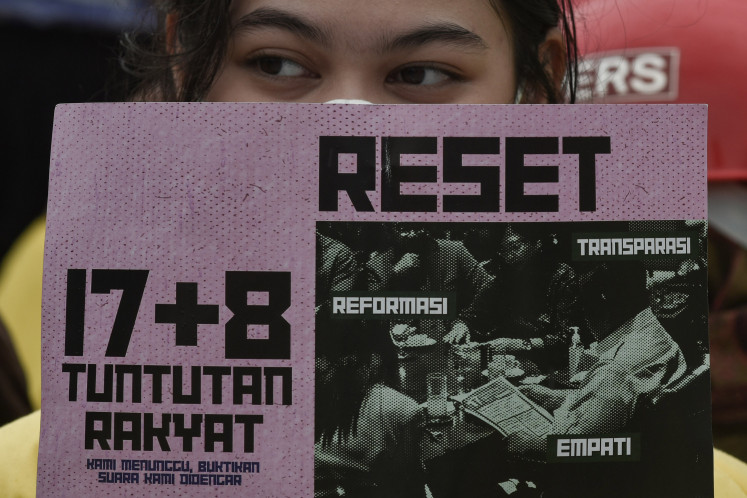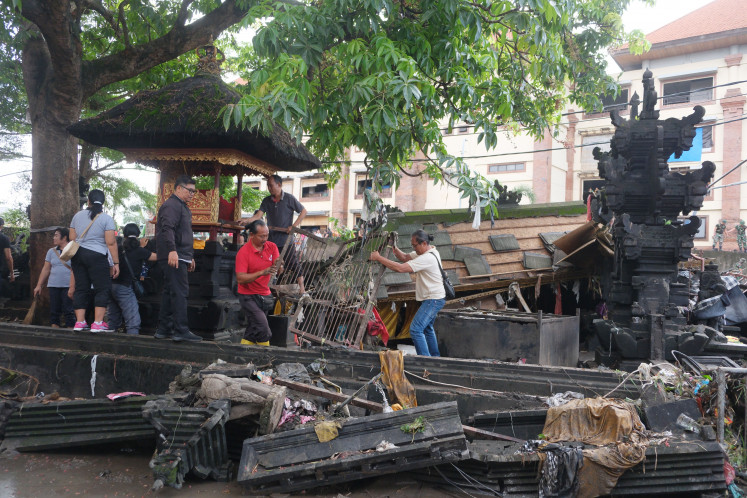Popular Reads
Top Results
Can't find what you're looking for?
View all search resultsPopular Reads
Top Results
Can't find what you're looking for?
View all search resultsBeef self-sufficiency unlikely
Meaty matters: The Trade Ministryâs director general for national export development Gusmardi Bustami (left) and Muchammad Romahurmuziy, chairman of the House of Representatives commission IV overseeing agriculture, talk during a discussion on beef imports at JS Luwansa Hotel in Jakarta on Tuesday
Change text size
Gift Premium Articles
to Anyone
 Meaty matters: The Trade Ministryâs director general for national export development Gusmardi Bustami (left) and Muchammad Romahurmuziy, chairman of the House of Representatives commission IV overseeing agriculture, talk during a discussion on beef imports at JS Luwansa Hotel in Jakarta on Tuesday. (JP/R. Berto Wedhatama) (left) and Muchammad Romahurmuziy, chairman of the House of Representatives commission IV overseeing agriculture, talk during a discussion on beef imports at JS Luwansa Hotel in Jakarta on Tuesday. (JP/R. Berto Wedhatama)
Meaty matters: The Trade Ministryâs director general for national export development Gusmardi Bustami (left) and Muchammad Romahurmuziy, chairman of the House of Representatives commission IV overseeing agriculture, talk during a discussion on beef imports at JS Luwansa Hotel in Jakarta on Tuesday. (JP/R. Berto Wedhatama) (left) and Muchammad Romahurmuziy, chairman of the House of Representatives commission IV overseeing agriculture, talk during a discussion on beef imports at JS Luwansa Hotel in Jakarta on Tuesday. (JP/R. Berto Wedhatama)
M
span class="caption" style="width: 510px;">Meaty matters: The Trade Ministry's director general for national export development Gusmardi Bustami (left) and Muchammad Romahurmuziy, chairman of the House of Representatives commission IV overseeing agriculture, talk during a discussion on beef imports at JS Luwansa Hotel in Jakarta on Tuesday. (JP/R. Berto Wedhatama)
President Susilo Bambang Yudhoyono's ambition to make the country self-sufficient in beef, among other main commodities, will likely remain out of sight, thanks to growing beef demand, coupled with low domestic supply.
The low domestic supply is attributed to the declining local cow population, as farmers allegedly sell their cows to take profits immediately when beef prices are high, business players and officials conveyed in a seminar.
On the other hand, beef consumption will continue to increase, driven by higher income per capita and the growing middle-class, according to National Meat Processors Association (Nampa) chairman Ishana Mahisa.
'For the meat processing industry, demand grows because people now consume more processed meat, such as sausages and beef patties,' he said in the seminar titled 'Beef Imports: Quota Issues under the WTO' in Jakarta on Tuesday.
According to Ishana, Nampa members' demand for meat grows by about 14 percent year-on-year. In 2013, meat demand, including from chicken, is estimated to reach around 160,000 tons, about the same level as last year.
However, he said, domestic supply had not been able to meet the demand, especially since the industry required specific meat parts and quality, such as in the secondary beef cut segment, on which the government imposes an import quota.
Demand in the segment, which produces smoked beef among other products, ranges between 2,000 tons and 3,000 tons per year.
The country, which has a population of 240 million, consumes around 500,000 tons of beef every year. That is equal to about 1.8 kilograms to 2.2 kilograms per capita per year, according to Ishana.
'The total consumption can reach more than 600,000 tons when expatriates, whose consumption per capita can be 10 to 20 times higher, are accounted for,' he said, adding consumption by foreign tourists also added to the figure, although it could not be estimated.
To meet growing demand and prevent price increases, the government recently appointed the State Logistics Agency (Bulog) to import an additional 3,000 tons of beef, on top of this year's import quota of 80,000 tons, or around 15 percent of domestic consumption.
Beef imports accounted for 19 percent of domestic consumption last year. More than half of domestic beef consumption relied on imports in 2009.
Faiz Achmad, director for food, marine products and fishery industries at the Industry Ministry, said the secondary beef cut business alone grew between 10 and 15 percent every year, and the products continued to diversify.
'But business players in this segment are not allowed to import the raw materials even though local supply does not always meet the requirements,' he said.
Faiz and Ishana insisted the government must separate the processing industry's demand from that of general consumption when calculating a beef import quota. They also said business players from that industry should be allowed to import raw materials of secondary cuts when necessary.
Meanwhile, Central Statistics Agency head Suryamin said his office noticed a declining cow population, although it was yet to conclude its assessment. The agency earlier estimated that the cow population declined by around 20 percent to about 12 million in 2012, said media reports.
'In several provinces, farmers sold their cows to slaughterhouses when beef prices skyrocketed last year,' he said by phone, explaining the cause of the dwindling cow population.
The price of beef doubled during Idul Fitri last year from Rp 40,000 (US$4) to Rp 50,000 per kilogram to Rp 75,000 to Rp 80,000 per kilogram due to the lack of supply.
Indonesian Employers Association (Apindo) deputy chairman Anton Supit urged the government to develop a grand design to solve the supply demand issue. 'It is not fair to leave it all to farmers and breeders to reach self-sufficiency.'
Muchammad Romahurmuziy, chairman of House of Representatives commission IV overseeing agriculture, said the House was now formulating a revision to the 2009 Animal Husbandry and Health Law that would help ensure supply.
He said the revision also consisted of stricter health procedures, including quarantine measures. The bill would also make it possible for the establishment of a 'quarantine island'. He expects that the bill would be passed into law by years-end.
The revision is being carried out following a 2010 Constitutional Court ruling that annulled several clauses and thus ordered lawmakers to revise them.









